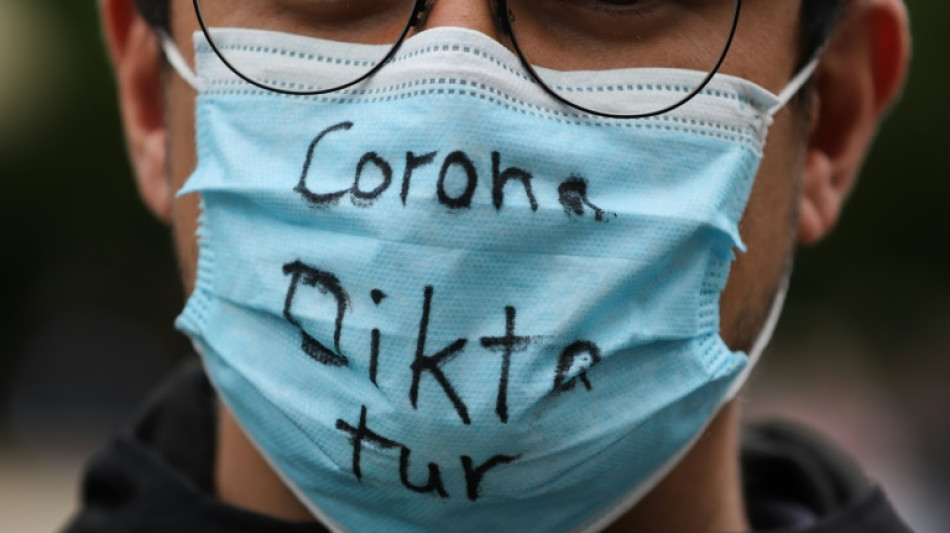
-
 What do some researchers call disinformation? Anything but disinformation
What do some researchers call disinformation? Anything but disinformation
-
Jimmy Kimmel show to return Tuesday

-
 Unification Church leader arrested in South Korea
Unification Church leader arrested in South Korea
-
Singapore firm rejects $1bn Sri Lankan pollution damages

-
 Chile presidential contender vows to deport 'all' undocumented migrants
Chile presidential contender vows to deport 'all' undocumented migrants
-
China may strengthen climate role amid US fossil fuel push

-
 Ryder Cup captains play upon emotions as practice begins
Ryder Cup captains play upon emotions as practice begins
-
Bradley defends US Ryder Cup player payments as charity boost

-
 Trump ties autism risk to Tylenol as scientists urge caution
Trump ties autism risk to Tylenol as scientists urge caution
-
Dembele beats Yamal to Ballon d'Or as Bonmati retains women's award

-
 Strength in Nvidia, Apple helps lift US equities to new records
Strength in Nvidia, Apple helps lift US equities to new records
-
Man City 'keeper Donnarumma says would have stayed at PSG

-
 49ers ace Bosa to miss season after knee injury: reports
49ers ace Bosa to miss season after knee injury: reports
-
Canada wildlife decline 'most severe' in decades: WWF

-
 PSG star Dembele wins men's Ballon d'Or
PSG star Dembele wins men's Ballon d'Or
-
Napoli beat battling Pisa to maintain perfect Serie A start

-
 Spain's Aitana Bonmati wins Women's Ballon d'Or
Spain's Aitana Bonmati wins Women's Ballon d'Or
-
Jimmy Kimmel show to return Tuesday: Disney

-
 Marseille inflict first defeat of season on PSG in Ligue 1
Marseille inflict first defeat of season on PSG in Ligue 1
-
White House promises US-controlled TikTok algorithm

-
 Trump expected to tie autism risk to Tylenol as scientists urge caution
Trump expected to tie autism risk to Tylenol as scientists urge caution
-
Macron recognizes Palestinian state at landmark UN summit

-
 Hong Kong prepares for 'serious threat' from Super Typhoon Ragasa
Hong Kong prepares for 'serious threat' from Super Typhoon Ragasa
-
S. Korea court issues arrest warrant for Unification Church leader: Yonhap

-
 New US Fed governor says rates should be around 'mid-2%'
New US Fed governor says rates should be around 'mid-2%'
-
14 killed as rival Ecuadoran inmates fight with guns, explosives

-
 Dozens of French towns flout government warning to fly Palestinian flag
Dozens of French towns flout government warning to fly Palestinian flag
-
Nvidia to invest up to $100 bn in OpenAI data centers

-
 US mulls economic lifeline for ally Argentina
US mulls economic lifeline for ally Argentina
-
France to recognize Palestinian state at contentious UN

-
 Museum or sheikh? World's second largest diamond awaits home
Museum or sheikh? World's second largest diamond awaits home
-
UK charities axe Prince Andrew's ex-wife over Epstein email

-
 Google fights breakup of ad tech business in US court
Google fights breakup of ad tech business in US court
-
US pleads for new beefed-up multi-national force in Haiti

-
 'Don't repeat our mistakes' - Russian writer Akunin warns against creeping repression
'Don't repeat our mistakes' - Russian writer Akunin warns against creeping repression
-
Stocks steady ahead of key US inflation data

-
 Jews flock to Ukraine for New Year pilgrimage despite travel warning
Jews flock to Ukraine for New Year pilgrimage despite travel warning
-
Trump autism 'announcement' expected Monday

-
 Over 60,000 Europeans died from heat during 2024 summer: study
Over 60,000 Europeans died from heat during 2024 summer: study
-
Clashes as tens of thousands join pro-Palestinian demos in Italy

-
 UK charity axes Prince Andrew's ex-wife over Epstein email
UK charity axes Prince Andrew's ex-wife over Epstein email
-
France, others to recognize Palestinian state at UN

-
 IAEA says Iran nuclear diplomacy at a 'difficult juncture'
IAEA says Iran nuclear diplomacy at a 'difficult juncture'
-
Merz tasks banker with luring investment to Germany

-
 Russia offers to extend nuclear arms limits with US by one year
Russia offers to extend nuclear arms limits with US by one year
-
Stocks turn lower ahead of key US inflation data

-
 Gavi to undergo knee operation on meniscus injury: Barcelona
Gavi to undergo knee operation on meniscus injury: Barcelona
-
Frenchman denies killing wife in case that captivated France

-
 Bavuma out of Test series in Pakistan as De Kock back for ODIs
Bavuma out of Test series in Pakistan as De Kock back for ODIs
-
Bavuma out of Test series as De Kock back for white-ball games


Germany weighs ban on Telegram, tool of conspiracy theorists
The German government is considering a ban on encrypted messaging app Telegram after it was repeatedly used as a channel for spreading anti-vaccine conspiracy theories and even death threats.
The app has also played a key role in mobilising turnout at some of the most violent protests in opposition to the German government's Covid-19 policies since the start of the pandemic.
With parliament due to begin debating compulsory vaccination on Wednesday, authorities fear that the controversial issue could risk firing up another wave of rage.
With this in mind, politicians have set their sights on tighter controls on Telegram.
Interior Minister Nancy Faeser will unveil plans by Easter to require the app to delete messages that contain death threats or hate speech and identify their authors.
If Telegram fails to comply, the government could even ban the service completely.
"We will ensure that those spreading hate are identified and held accountable," Faeser told the Bundestag lower house of parliament in mid-January.
She also told Die Zeit newspaper that Telegram could be deactivated in Germany if it failed to comply with local laws and "all other options have failed".
Telegram chat groups, which can include up to 200,000 members, have been used by some anti-vaccine protesters to share false information and to encourage violence against politicians.
In December, German police seized weapons during raids in the eastern city of Dresden after a Telegram group was used to share death threats against a regional leader.
The same month, Telegram was used to mobilise a group of coronavirus-sceptics to mass outside the house of Petra Koepping, the health minister of Saxony state, armed with flaming torches.
A message viewed by 25,000 people had called for people opposing Covid restrictions to share private addresses of German "local MPs, politicians and other personalities" who they believed were "seeking to destroy" them through pandemic curbs.
- New avenues -
At the height of a refugee crisis that erupted in 2015, online social networking tools Facebook and Twitter fell foul of the authorities as they were seized by the far-right to spread virulent anti-immigrant content.
In 2017, Germany passed a controversial law that requires the social network giants to remove illegal content and report it to the police.
Facebook said in September it had deleted accounts, pages and groups linked to the "Querdenker" (Lateral Thinkers), a movement that has emerged as the loudest voice against the German government's coronavirus curbs.
But that pushed opposing voices to other platforms, with Telegram emerging as the app of choice.
"Since the big platforms like Facebook no longer allow racist, anti-Semitic hate and far-right content like Holocaust denial, people who want to spread this are looking for new avenues," Simone Rafael, digital manager for the Amadeu Antonio anti-racism foundation, told AFP.
"Currently, the most popular one in Germany is Telegram," Rafael said.
While Facebook has an interest in maintaining a presence in Germany and has gradually submitted to national legislation, this is not the case with Telegram, the expert said.
"Telegram is not cooperating with the judicial or security authorities, even on indisputably punishable and reprehensible matters such as child pornography," a behaviour that "deprives the state of any capacity for action", Rafael said.
With Telegram not budging, German federal police are even planning to start flooding the company with requests for content deletion to push it into action, reported Die Welt daily.
- 'Very bad signal' -
One option for the government could be to require Google or Apple to remove Telegram from their app stores. However, this would not affect users who have already downloaded the app.
For Rafael, the only solution is to ban the app completely.
That would make Germany the first Western country to outlaw Telegram, created in 2013 by Russian brothers Nikolai and Pavel Durov, two opponents of Russian President Vladimir Putin who sought to avoid surveillance by their country's secret services.
The company is currently headquartered in Dubai, with its parent group in British Virgin Islands.
Telegram is already banned or heavily regulated in China, India and Russia.
But a move against the app could also spark further dissent in Germany.
Such a drastic step would "send a very bad signal", according to digital journalist Markus Reuter.
"On the one hand we are celebrating Telegram's lack of censorship and its importance for democratic movements in Belarus and Iran, and on the other, we are then disabling the service here" in Germany, he said.
L.Harper--AMWN